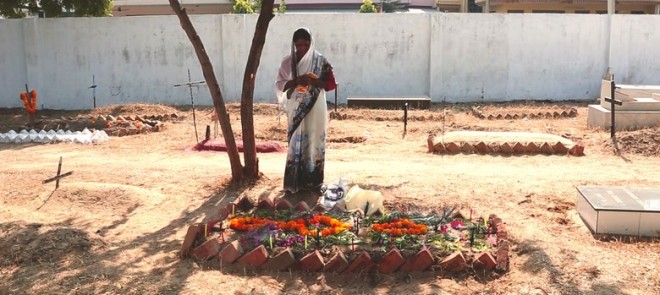
DIR.: PANKAJ JOHAR | Documentary | India/Norway | 83 min.
Director/producer/DoP Pankaj Johar (Still Standing) has invested a great deal of emotional energy in his documentary CECILIA: becoming a participant rather than a detached observer in this tragic film about child-trafficking.
Cecilia Hasda was 54 when she arrived in Delhi from her village in Bengal (1500 km away) to housekeep for Pankaj Johar and his lawyer wife, Sunaina, in the first year of their marriage. Almost immediately Cecilia finds out that her daughter Mati, 14, has been found dead in Dehli, having hanged herself. Cecilia is naturally distraught, and Pankaj and Sunaina try to help her investigate the circumstances of Mati’s death. The couple shamefully admit that they have employed children as young as twelve to work for them when they finally discover a child-trafficking ring, led by a certain Rafiq, who ‘bought’ Mati in her home village, obviously with the consent of her father – and, as it turns out, the consent of the whole village. In turns out that all the villagers are in league with Rafiq and his men, paying them to procure household staff.
Researching the widespread issue of child-trafficking, Johar and his wife meet the campaigner Kailash Satyarthi, who has fought against the practice for twenty years, just before being awarded the Nobel Peace Price. Mati’s employers approach Cecilia offering her compensation for her loss, on the proviso that she agrees to swear to an affidavit that they treated Mati well. But soon it becomes clear that Cecilia’s husband is attempting to have Rafiq freed from jail. Cecilia learns that he has agreed to the affidavit on the basis that he was divorced from her at the time when Mati started work in Dehli, so making it impossible for Cecilia to pursue the case further.
Pankaj and Sunaina travel with Cecilia twice to her home village, but are frightened away by the villagers, who blame Cecilia for setting the police on them. At one point Sunaina is so upset she admits: “I don’t trust anybody in this country”. And it turns out that she is right: the villagers and her husband put Cecilia under pressure to take back the accusations against Rafiq. Returning to her home village for good she steadily becomes an alcoholic.
Working on three levels, CECILIA is a testament to the evils of child trafficking; an exposé of the financial benefits of the racket to the police and legal authorities (who are well compensated); and a portrait of a middle class Indian couple who finally wake up to the stark reality of their domestic lives. At least Pankaj Johar accepts his co-responsibility for the injustice he exposes in this brutally frank documentary. AS
SCREENING AT BERTHA DOCHOUSE | www.dochouse.org for tickets